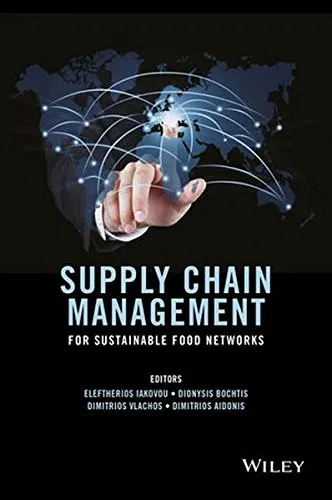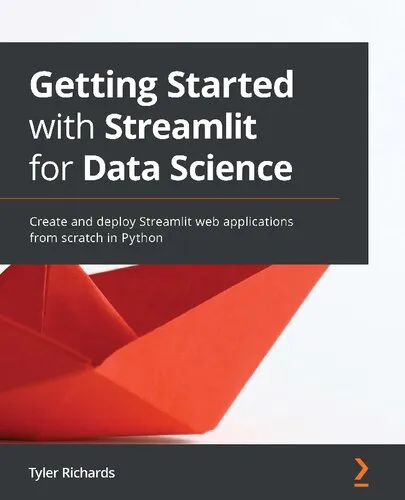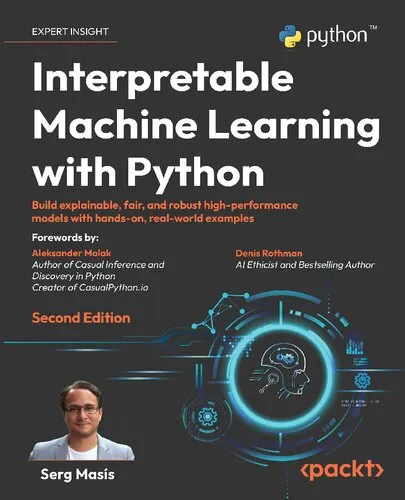Supply Chain Management for Sustainable Food Networks
4.3
Reviews from our users

You Can Ask your questions from this book's AI after Login
Each download or ask from book AI costs 2 points. To earn more free points, please visit the Points Guide Page and complete some valuable actions.Related Refrences:
Introduction to Supply Chain Management for Sustainable Food Networks
The global food supply chain is a complex network of interconnected systems that ensure the nourishment of billions of people worldwide. However, the ever-increasing challenges posed by climate change, resource scarcity, economic instability, and consumer demands have transformed the traditional food supply systems. To address these pressing issues effectively, Supply Chain Management for Sustainable Food Networks provides a comprehensive exploration of how sustainability principles can be integrated within food supply chains.
This book is an essential guide for academics, practitioners, policymakers, and students who are interested in understanding and applying sustainable practices in food supply chains. It brings forward cutting-edge strategies, real-world examples, and theoretical frameworks to empower readers in building robust, efficient, and environmentally conscious food networks. As the food industry is inherently linked to resource exploitation and environmental impacts, adopting sustainable practices is no longer an option but a necessity for long-term viability.
The authors—Eleftherios Iakovou, Dionysis Bochtis, Dimitrios Vlachos, and Dimitrios Aidonis—combine their collective expertise in supply chain management, engineering, and sustainability to create a compelling narrative that balances theory and practicality. Their interdisciplinary approach ensures that this book addresses not only operational efficiency but also the social and environmental aspects of food networks. From production to distribution and consumption, this book emphasizes the critical role of supply chains in creating a sustainable food system.
Detailed Summary of the Book
The book delves deeply into the dynamics of sustainable food supply chains, examining each stage of the process and offering actionable recommendations. It begins by outlining the relationship between food supply chains and sustainability, discussing the environmental, social, and economic challenges that threaten these systems. Part of this involves an exploration of key sustainability metrics and their application in real-world supply chain settings.
Moving beyond the basics, the authors introduce tools and methodologies for evaluating and improving the sustainability of food supply networks. Through a balanced mix of theoretical constructs and practical applications, the book demonstrates how companies can align their supply chain strategies with global sustainability goals.
The latter sections of the book focus on advanced topics, including the integration of new technologies like IoT (Internet of Things), blockchain for traceability, and data-driven analytics to enhance visibility and decision-making. It also considers how collaborative supply chain practices and partnerships among stakeholders can lead to more sustainable systems. By examining case studies and industry insights, this book equips readers with the knowledge and tools to build resilient, adaptable, and eco-friendly food networks.
Key Takeaways
- Understanding the importance of sustainability in the modern food supply chain.
- Assessment techniques to measure environmental, social, and economic impacts.
- Practical methodologies to optimize the efficiency and sustainability of food supply networks.
- The role of digital technologies like blockchain, IoT, and big data analytics in driving sustainability.
- Insights into case studies and industry best practices for sustainable supply chain management.
- Strategies for fostering collaboration among stakeholders to achieve sustainability goals.
Famous Quotes from the Book
"Sustainability in food supply chains is not simply a competitive advantage—it is an ethical obligation and a critical necessity for the survival of future generations."
"In the era of resource scarcity, the optimization of supply chains is no longer about productivity alone; it is also about using resources wisely for the preservation of ecosystems and communities."
"The integration of digital technologies is revolutionizing the way we perceive and manage food sustainability, transforming documentation into actionable intelligence."
Why This Book Matters
In an age where food insecurity, environmental degradation, and social inequalities are at the forefront of global concerns, this book provides a roadmap for change. It challenges conventional supply chain models, offering innovative solutions tailored to address the unique pressures faced by the food industry. By delivering an interdisciplinary and systems-oriented perspective, the authors contribute not only to the academic community but also to businesses, governments, and societies striving to build a resilient and sustainable food future.
What sets this book apart is its focus on actionable and scalable ideas. Unlike other works that are purely theoretical, this book merges sustainability principles with the realities of modern-day supply chain operations. It highlights the interconnectedness of stakeholders across the supply chain and explores the impact of their collective decisions on social, economic, and environmental outcomes.
In conclusion, Supply Chain Management for Sustainable Food Networks is more than just a book; it is a call to action. It equips readers with the knowledge, tools, and inspiration to innovate and transform food supply chains in the face of global challenges. Whether you are a student, researcher, policy advocate, or business professional, this book is an invaluable resource for achieving sustainable progress.
Free Direct Download
You Can Download this book after Login
Accessing books through legal platforms and public libraries not only supports the rights of authors and publishers but also contributes to the sustainability of reading culture. Before downloading, please take a moment to consider these options.
Find this book on other platforms:
WorldCat helps you find books in libraries worldwide.
See ratings, reviews, and discussions on Goodreads.
Find and buy rare or used books on AbeBooks.
1213
بازدید4.3
امتیاز0
نظر98%
رضایتReviews:
4.3
Based on 0 users review
Questions & Answers
Ask questions about this book or help others by answering
No questions yet. Be the first to ask!





![The Ultimate iOS Interview Playbook: Conquer Swift, frameworks, design patterns, and app architecture [Team-IRA]](https://s3.refhub.ir/images/thumb/The_Ultimate_iOS_Interview_Playbook__Conquer__29925.webp)







